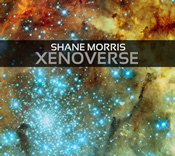You don’t have to spend three consecutive hours floating around in Shane Morris’ “Verses Trilogy” of related long-form works, Multiverse, Omniverse, and Xenoverse, but I’m here to tell you that are worse ways to spend three hours. For each release, Morris took elements from live performances from his “Atmosphera” radio show and melted them into “sound collages.” Or, more to the point, created thoughtful, long-form drifts that glide in and out of darkness while they blend spacemusic breadth and the pulse of tribal. While thematically connected, each release is definitely its own excursion.
 Multiverse, the first release, wastes no time in taking the listener deep, and proceeds to escort us through a variety of feelings and spaces. After opening with a somewhat dark and spacey run, Morris cuts the sound way back and peppers the flow with little snaps of microsound. I really like this stretch. These ear-tickling bits work as light percussive elements as he bounces them around. He folds in the first of several manipulated soundbites, a nice unexpected touch and a sample (no pun) of how varied his elements are for this run. I found certain stretches to be reminiscent of Steve Roach’s Early Man, particularly in spots that feature a twanging, almost metallic sound that textures dark, droning backdrops. There are very distinct zones, if you will, as this piece moves along, and the borders between them are perfectly blurred and blended, to a point where often you become quite suddenly aware of a difference–even though you’ve been in it for a few minutes. In the closing moments, the sound is pared back to a sparse, whispering place where metallic clatters bang out an off-kilter rhythm; the sounds pare away to a windy hiss and crackling pops of static, then fade.
Multiverse, the first release, wastes no time in taking the listener deep, and proceeds to escort us through a variety of feelings and spaces. After opening with a somewhat dark and spacey run, Morris cuts the sound way back and peppers the flow with little snaps of microsound. I really like this stretch. These ear-tickling bits work as light percussive elements as he bounces them around. He folds in the first of several manipulated soundbites, a nice unexpected touch and a sample (no pun) of how varied his elements are for this run. I found certain stretches to be reminiscent of Steve Roach’s Early Man, particularly in spots that feature a twanging, almost metallic sound that textures dark, droning backdrops. There are very distinct zones, if you will, as this piece moves along, and the borders between them are perfectly blurred and blended, to a point where often you become quite suddenly aware of a difference–even though you’ve been in it for a few minutes. In the closing moments, the sound is pared back to a sparse, whispering place where metallic clatters bang out an off-kilter rhythm; the sounds pare away to a windy hiss and crackling pops of static, then fade.
 Omniverse starts in a darker, edge-of-tribal space. Groaning drones and metallic percussion provide the initial drive forward. But this is not where we’ll spend most of our time. Morris softens the flow after several minutes, then nudges it into a wider, sparse and minimal space, keeping a pulse of simple taps to mark time. He’s very comfortable in places like this, using a comparatively small sound-set and pulling ample amounts of imagery and feeling out of it, and this makes up the majority ofOmniverse. One phase is built on a repeating pad that swells and fades while Morris coats the background with a hiss of wind and field recordings. It gives way to a slow sequencer segment with vibraphone tones jazzing up the flow. The last third of the piece runs from an energetic, sequencer-based rush into a deeper drone-space that coasts to a close. There’s a dissonant edge, particularly in the closing minutes, that delivers the feel of open-ended story, of some slightly unresolved narrative aspect. Omniverse seems to have more distinct delineations between its identities than Multiverse. The borders are more obvious, but the shifts still work.
Omniverse starts in a darker, edge-of-tribal space. Groaning drones and metallic percussion provide the initial drive forward. But this is not where we’ll spend most of our time. Morris softens the flow after several minutes, then nudges it into a wider, sparse and minimal space, keeping a pulse of simple taps to mark time. He’s very comfortable in places like this, using a comparatively small sound-set and pulling ample amounts of imagery and feeling out of it, and this makes up the majority ofOmniverse. One phase is built on a repeating pad that swells and fades while Morris coats the background with a hiss of wind and field recordings. It gives way to a slow sequencer segment with vibraphone tones jazzing up the flow. The last third of the piece runs from an energetic, sequencer-based rush into a deeper drone-space that coasts to a close. There’s a dissonant edge, particularly in the closing minutes, that delivers the feel of open-ended story, of some slightly unresolved narrative aspect. Omniverse seems to have more distinct delineations between its identities than Multiverse. The borders are more obvious, but the shifts still work.
 Xenoverse breaks the trilogy’s long-form mold by offering three pieces–two in the 20-minute range and one under 10. It’s also the one that glides closest to a dark ambient sound.–although, again, on the two longer tracks, Morris keeps the work in constant flux so that just as you’re firmly entrenched in one sense, you’re guided into something different. Part Two is a shadow-choked drone that curls around you like cold fog. Part Three takes that and runs with it, its first section gouging out a very dark, groaning space. As Morris scrapes the sound down to a thin drone, vocal drops return (try not to jump), giving way again to field recordings of birds and insects. Slowly, chimes fade into the mix. This is a point where Morris’ tonal shift is downright elegant, smoothly handled and seamless. It’s a shift from dark to half-light that comes on like dawn, but doesn’t quite deliver us there. Rather, we slip back to the murk as the trilogy comes to a close.
Xenoverse breaks the trilogy’s long-form mold by offering three pieces–two in the 20-minute range and one under 10. It’s also the one that glides closest to a dark ambient sound.–although, again, on the two longer tracks, Morris keeps the work in constant flux so that just as you’re firmly entrenched in one sense, you’re guided into something different. Part Two is a shadow-choked drone that curls around you like cold fog. Part Three takes that and runs with it, its first section gouging out a very dark, groaning space. As Morris scrapes the sound down to a thin drone, vocal drops return (try not to jump), giving way again to field recordings of birds and insects. Slowly, chimes fade into the mix. This is a point where Morris’ tonal shift is downright elegant, smoothly handled and seamless. It’s a shift from dark to half-light that comes on like dawn, but doesn’t quite deliver us there. Rather, we slip back to the murk as the trilogy comes to a close.
Considering that these are three separate live pieces culled from segments, the ease and consistency of flow in the “Verses Trilogy,” including across the series, is excellent. As noted, some transitions are smoother than others when looked at overall, but (for example) Omniverse‘s more obvious changes work quite well within the context of Omniverse. For live flows, even edited, there’s a distinct lack of the jumpiness that can occur in trying to keep a piece going live; there’s rarely a moment where you feel at all disrupted from the journey. (I confess to finding a couple spots; individual mileage will vary.) All in all, three very good, borderline-dark ambient chapters from Shane Morris.
Review at Hypnagogue:
Shane Morris: Multiverse/Omniverse/Xenoverse
 Multiverse, the first release, wastes no time in taking the listener deep, and proceeds to escort us through a variety of feelings and spaces. After opening with a somewhat dark and spacey run, Morris cuts the sound way back and peppers the flow with little snaps of microsound. I really like this stretch. These ear-tickling bits work as light percussive elements as he bounces them around. He folds in the first of several manipulated soundbites, a nice unexpected touch and a sample (no pun) of how varied his elements are for this run. I found certain stretches to be reminiscent of Steve Roach’s Early Man, particularly in spots that feature a twanging, almost metallic sound that textures dark, droning backdrops. There are very distinct zones, if you will, as this piece moves along, and the borders between them are perfectly blurred and blended, to a point where often you become quite suddenly aware of a difference–even though you’ve been in it for a few minutes. In the closing moments, the sound is pared back to a sparse, whispering place where metallic clatters bang out an off-kilter rhythm; the sounds pare away to a windy hiss and crackling pops of static, then fade.
Multiverse, the first release, wastes no time in taking the listener deep, and proceeds to escort us through a variety of feelings and spaces. After opening with a somewhat dark and spacey run, Morris cuts the sound way back and peppers the flow with little snaps of microsound. I really like this stretch. These ear-tickling bits work as light percussive elements as he bounces them around. He folds in the first of several manipulated soundbites, a nice unexpected touch and a sample (no pun) of how varied his elements are for this run. I found certain stretches to be reminiscent of Steve Roach’s Early Man, particularly in spots that feature a twanging, almost metallic sound that textures dark, droning backdrops. There are very distinct zones, if you will, as this piece moves along, and the borders between them are perfectly blurred and blended, to a point where often you become quite suddenly aware of a difference–even though you’ve been in it for a few minutes. In the closing moments, the sound is pared back to a sparse, whispering place where metallic clatters bang out an off-kilter rhythm; the sounds pare away to a windy hiss and crackling pops of static, then fade.
